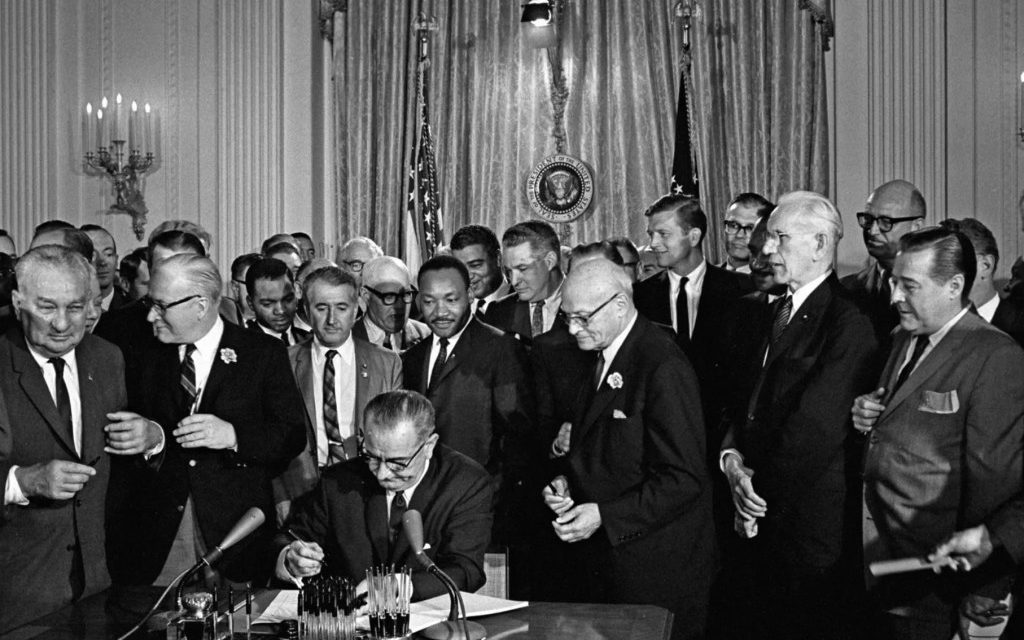By Ashlee Banks
Special to the AFRO
It is impossible to overlook the pivotal role Dr. Martin Luther King Jr. played not only as the moral compass of the Civil Rights Movement but also as its strategic and political architect. While his famous speeches and marches helped galvanize the masses, it was his political acumen, his ability to build coalitions, and his unyielding pursuit of justice that ultimately led to the passage of landmark legislation, the Civil Rights Act of 1964 and the Voting Rights Act of 1965.

The power of Dr. King’s strategic vision
Whether it be voting rights or anti-poverty measures, as the legislators of today take up their respective causes, they are undoubtedly influenced by the work of King and his partners in the fight for civil and human rights.
U.S. Rep. Gabe Amo (D-R.I.-1) shared with the AFRO why he admires Dr. King.
“Dr. Martin Luther King Jr. is a personal hero of mine—not just because of his towering legacy on civil rights or the incredible power of his example– but because he recognized that progress is the result of initiative plus stamina,” said Amo.
Amo’s words encapsulate Dr. King’s approach to social change. It was not enough to speak out against injustice; one had to navigate the complex political systems, build alliances across divides and maintain a steadfast commitment to long-term progress.
Dr. King’s approach was deeply rooted in his belief that “the time is always right to do what is right.” His political leadership was not merely reactive; it was strategic and proactive, a vision that sought to align public sentiment with legislative action. His ability to unify various factions, including religious, political and activist groups, was the key to the passage of legislation that transformed the fabric of American society.
The Civil Rights Act of 1964
The Civil Rights Act of 1964 is perhaps the most enduring achievement of Dr. King’s efforts. After years of tireless activism, protests and civil disobedience, this sweeping legislation became the bedrock of the modern Civil Rights Movement. It outlawed discrimination on the basis of race, color, religion, sex or national origin, and it made it illegal for employers to discriminate in hiring practices. The legislation opened up new opportunities for Black Americans and other marginalized groups. The Act also prohibited discrimination in public accommodations and provided greater protections for the right to vote.
Dr. King’s leadership was instrumental in shaping public opinion and pushing the federal government to act. His marches, speeches and direct engagement with politicians brought national attention to the injustices of segregation and racial discrimination, demanding that the government fulfill its promise of equality for all. His political savvy ensured that the demands of the movement were not just moral calls for justice, but legislative imperatives.
U.S. Rep. Sydney Kamlager-Dove (D-Calif.-37) told the AFRO that she credits Dr. King for the passage of several landmark pieces of legislation.
“Rev. Dr. Martin Luther King Jr. was not only the moral and spiritual North Star of the Civil Rights Movement but also its chief political strategist. The legislative achievements of the movement, including the Civil Rights Act and the Voting Rights Act, stand as a testament to his courage, his ability to set aside differences in pursuit of a common goal, and his enduring belief that ‘the time is always right to do what is right,’” said Kamlager-Dove.
The Democratic lawmaker’s words reflect the deep influence Dr. King had in both the political and social spheres.
The Voting Rights Act of 1965
Following the success of the Civil Rights Act, Dr. King turned his attention to the disenfranchisement of Black voters, particularly in the South. The Voting Rights Act of 1965, signed into law by President Lyndon B. Johnson, aimed to eliminate barriers to voting, such as literacy tests and poll taxes, that were disproportionately used to prevent Black Americans from exercising their constitutional right to vote. The Act also provided federal oversight of elections in areas with a history of discrimination.
This victory was not achieved without struggle. Dr. King led countless protests, most notably the Selma to Montgomery marches in 1965, which brought attention to the systematic denial of voting rights. His leadership was critical in pushing the Johnson administration to act, and the public outcry from these protests became a catalyst for change in Washington, D.C.
“Dr. King’s strategic vision for building coalitions and driving public sentiment continues to inspire us to this day,” said Congressman Amo.
Dr. King’s recognition that change requires both public mobilization and political maneuvering allowed him to bridge the gap between grassroots activism and institutional reform. His ability to keep the momentum of the movement alive through both protest and legislative lobbying was instrumental in passing these landmark laws.
A legacy of courage and coalition-building
The Civil Rights Act of 1964 and the Voting Rights Act of 1965 stand as monumental victories for Dr. King and the Civil Rights Movement. However, these laws were not just the result of individual efforts—they were the product of collaboration, coalition-building, and a shared commitment to justice. Dr. King was not only the voice of the movement but also its strategist, able to unite disparate groups and drive national conversation about civil rights and racial justice.
As we reflect on Dr. King’s contributions, it is clear that his vision for America was not just about moral righteousness, but about a nation that lived up to its founding ideals of liberty and equality. The civil rights legislation that Dr. King helped to pass serves as a reminder of what is possible when citizens, politicians and activists work together to bring about change.
As Congressman Amo put it: “The two pieces of federal legislation that he relentlessly advocated for, the Civil Rights Act of 1964 and the Voting Rights Act of 1965, stand as testament to what can be accomplished when America lives up to her founding ideals.”
Today, Dr. King’s legacy continues to inspire and guide lawmakers like U.S. Reps. Kamlager-Dove and Gabe Amo, who view him not just as a symbol of hope but as a model of political strategy and moral leadership.
The post Lawmakers reflect on the political strategy behind the Civil Rights Act and Voting Rights Act appeared first on AFRO American Newspapers.











